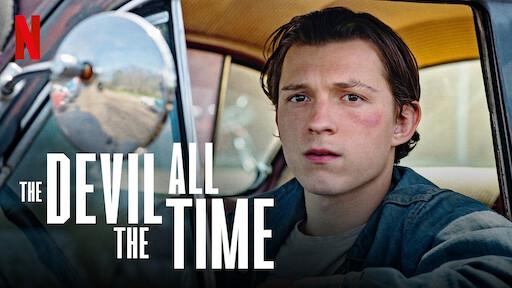Review: No rest for the wicked, or the audience, in ‘The Devil All the Time’

“The Devil All the Time,” now streaming on Netflix, is directed by Antonio Campos and based on Donald Ray Pollock’s 2011 novel of the same name.
September 20, 2020
“Fighting the devil” is a common saying, usually heard orated from behind preachers’ lofty pulpits on Sunday mornings.
This battle between good and evil rages in all the characters in “The Devil All the Time,” and more importantly, in the film itself. It’s a scattered feature that feels like a push and pull between some great performances and a director who values provocation over depth.
The movie, now streaming on Netflix, is directed by Antonio Campos and based on Donald Ray Pollock’s 2011 novel of the same name. It’s apt that Campos helmed this grim Southern Gothic, given that his previous two works were about a newscaster who commits suicide on air and a sociopath in Europe. The movie makes sure to constantly remind the audience of its grisly tone, awkwardly inserting its oppressive score overtop scenes of overplayed blood-soaked violence.
The movie opens in 1957 and follows Willard Russell (Bill Skarsgård), although he is just one of many depraved souls that Campos weaves together in this twisted tale. Recently sent home from combat in World War II, Willard returns to his hometown of Knockemstiff, Ohio, described by the narrator as a town whose inhabitants were almost all “connected by blood through some godforsaken calamity or another, be it lust or necessity or just plain ignorance.”
There is darkness in Willard’s past too, revealed through a sickening war flashback of him finding his sergeant barely alive and crucified on a hill in the South Pacific. Upon returning home with his new wife and child, Willard erects a similar structure in his backyard — a cross made out of chipped barn wood, this time meant as a prayer sanctum. But Willard’s fervid daily prayers can’t prevent everything, and tragedy soon strikes the family.
From there the movie takes a kaleidoscopic approach, jumping forward to 1967 to introduce us to myriad characters — a highlight reel of the world’s depravity, if you will. There is a murderous couple (Riley Keough and Jason Clarke) who lure hitchhikers with the temptations of the flesh, a corrupt cop (Sebastian Stan) who gets off on power and a charismatic new preacher (Robert Pattinson).
The moral center amid this evil is Arvin Russell, Willard’s son, played by Tom Holland. When the preacher exploits Arvin’s sister and kickstarts a family tragedy, Arvin embarks on a journey of vengeance, punishing the evil charlatans of Knockemstiff.
Campos gathered an impressive cast of high-caliber actors. Pattinson’s performance as the ostentatious Preston Teagardin is bound to dominate most of the discourse surrounding the film. He finds the perfect balance between being repulsive and entrancing, with a high-pitched drawl and honeyed words that drip with perversion. Knockemstiff, too, falls under his spell, buying into his paranoid message of the dangers of “delusions.”
Keough also stands out as the conflicted seductress in her husband’s sadistic killings. There are years of interiority and conflict behind her eyes, apparent in a scene where she struggles to bring herself to leave her psychopathic husband.
But the film buckles under the weight of its bloated cast. It’s clear that Campos reveres the source material — he features Pollock as the film’s narrator — but slimming it down to focus on key villains would have allowed for more space for characters to live. Too often, it seems like Campos was working off of a seven deadly sins checklist rather than a fully realized outline. As a result, characters like Sheriff Lee Bodecker fall through the cracks, despite being anchored by a solid performance from Sebastian Stan.
Other characters fall into the pitfall of becoming a Southern caricature, Willard especially. Skarsgård is completely miscast, with a baby face that never quite lives up to the gruff Southern accent he affects. Holland, trading in his Spidey suit for a denim jacket and work boots, is compelling but low-key to the point of forgettable.
Campos juggles an uneven cast, with the standout performances coming from minor characters with less screen time. Keough and Clarke’s scenes crackle with tension and a sense of foreboding as they lure and woo unassuming victims. Everyone in the movie has a different vice, and as the narrator says about Clarke, “only in the presence of death could he feel the presence of something like God.”
Unfortunately, other themes don’t receive as much attention, which is a shame, because the movie starts with compelling ideas about generational trauma. Willard’s religious expression mirrors his scarred psyche, so much so that he turns the object of his pain — a cross — into a shrine for his idealized world. Willard becomes so blinded in his faith that he can’t reconcile his hope for an omnipotent God with the realities of the world.
By the end of the movie, Campos forgoes moral complexity for an ending that merely reaffirms the downfalls of evil. Yes, watching gunshots explode heads and punches break noses is almost always attention-grabbing, but effective world-building comes from lived-in characters with realized motivations, not just gratuitous violence.
“The Devil All the Time” has all the trademarks of a blockbuster film — a cast of A-list stars, intriguingly cruel characters and high-tension scenes. And these elements are not all in vain. The movie succeeds in creating a gripping atmosphere from the first frame. But once the plot moves along, the film never manages to match that mood with an equally rich story.
Watching this movie may not warrant inclusion in your next confessional, but you also won’t be missing much if you sleep in this Sunday.


